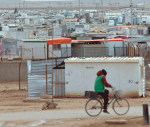You are here
Jordan's 'BB-' rating sign of stability for ‘foreseeable future’, economists say
By Mays Ibrahim Mustafa - May 13,2023 - Last updated at May 13,2023
AMMAN — Jordan has maintained its ‘BB-’ Long-Term Foreign-Currency Issuer Default Rating (IDR) with a stable outlook, according to Fitch Ratings.
“Jordan’s rating is supported by a record of macroeconomic stability, progress in fiscal and economic reforms, and resilient financing linked to the liquid banking sector, public pension fund and international support,” the report stated.
However, the rating is constrained by the government’s high debt combined with weak economic growth, domestic and regional political risks, “a sizeable current account deficit” and high net external debt, it added.
Economist Mohammad Al Basheer explained that an IDR assesses a borrower’s “creditworthiness” and their likelihood to default on financial obligations.
“A good IDR rating can be instrumental in attracting foreign investments and maintaining market confidence,” he told The Jordan Times.
Economist Hosam Ayesh said that a BB- rating indicates a “good” credit standing, especially amidst global and regional economic instabilities.
This indicates Jordan’s commitment to meeting its debt obligations and allows the government to borrow money from international organisations at a reasonable interest rate, he told The Jordan Times.
The government primarily relies on loans to close the budget deficit, Ayesh said, noting that this rating also allows it to explore the option of paying older loans by taking out new loans with a lower interest rate.
Although this rating is not considered “high”, it is evidence of monetary and economic stability in Jordan, “at least in the foreseeable future”, amidst a challenging global economic environment, Ayesh said.
Budget deficit
“Fitch estimates that Jordan’s general government budget deficit declined to 2.7 per cent of GDP in 2022, down from 2021, below our 3.8 per cent forecast made in August… due to continued growth in tax collection combined with expenditure restraint and reprioritisation to accommodating temporary fuel subsidies [phased out at end 2022],” the report stated.
Fitch also forecasts that the deficit will decline to 2.3 per cent in 2023, dropping to 1.9 per cent in 2024, as fiscal consolidation gradually continues.
“These projections balance efficiency and compliance-driven tax revenue growth and current spending restraint against the decision to keep strategic goods subsidies, as the government intends to make reforms sustainable in social terms,” the report added.
Government Debt
The report forecasts that consolidated general government debt, which “peaked” at 95.2 per cent of GDP in 2022, will continue to maintain a slow decline, reaching 93.1 per cent in 2024.
It also pointed out that “[c]entral government debt was higher at 114.8 per cent of GDP at end-2022 [this includes Social Security Investment Fund [SSIF] holdings of debt]”.
Basheer stressed that Jordan’s chronic budget deficit makes it heavily reliant on borrowing funds.
Although the report cites a “compliance-driven tax revenue growth” as one of the reasons that contributed to a decline in Jordan’s budget deficit last year, reducing taxes can actually boost investments, increase consumer spending and lead to higher economic growth, ultimately reducing reliance on loans, he said.
The report showed that the Kingdom’s net external debt, which stood at 23 per cent of GDP in 2022, is expect to increase to 27 per cent of GDP by 2024, due to “[r]elatively low non-debt creating inflows”.
IMF programme
According to Fitch, “Jordan continues to make progress in the International Monetary Fund [IMF] three-year Extended Fund Facility [EFF]”.
“The Kingdom completed the fifth review in December and is currently undergoing its sixth review. Remaining disbursements total $218 million, of which $97 million could be disbursed in 2023,” it noted.
External financial support
The report showed that the total foreign aid received by the Kingdom, reached $4.4 billion in 2022, “similar to 2021”, in addition to $2.6 billion budget support in 2022, compared to $2.4 billion in 2021.
It is estimated that Jordan will receive roughly $2.6 billion, equal to 5.2 of its GDP, in budget support in 2023, of which about 56 per cent is in the form of loans, it added.
Macro-Financial Stability
Fitch pointed out that the Kingdom’s macroeconomic and financial stability is maintained by “the longstanding exchange rate peg to the US dollar, adequate level of international reserves [projected to cover 6.8 months of current external receipts], low dollarisation [18.7 per cent of total deposits], a resilient banking sector and access to external financing”.
Growth recovery
According to Fitch, the economy’s growth, which recovered to 2.5 per cent in 2022, is forecast to increase to 2.7 per cent between 2023 and 2024, “as continued expansion in the services sector, including tourism and still supportive domestic credit conditions will balance the gradual fiscal consolidation and slower growth in the region”.
The report also referenced reform plans of the 2023 Economic Modernisation Vision, which aim to increase growth and reduce high unemployment by increasing investments in the private sector.
“Given its relatively small domestic market, Jordan’s capacity to attract investment will depend on global investor appetite, institutional capacity to implement reforms, regional growth prospects and geopolitical risks,” the report stated.
Related Articles
AMMAN — International credit rating agency Fitch Ratings on Thursday set Jordan's long-term foreign-currency issuer default rating (IDR) as
AMMAN — Fitch Ratings on Saturday confirmed that Jordan has maintained its Long-Term Foreign-Currency Issuer Default Rating (IDR) at "BB-" w
AMMAN — Fitch ratings affirming Jordan’s long-term foreign-currency Issuer Default Rating (IDR) at “BB-“ with a stable outlook that is undet















